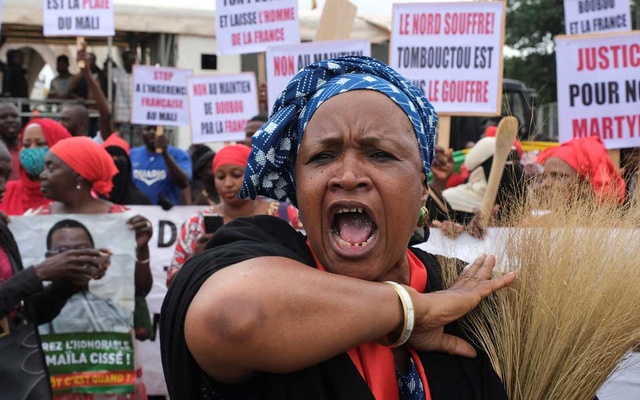
The New York Times: The military in Mali arrested the country’s president and prime minister Tuesday in a coup staged after weeks of destabilising protests over a disputed election, government corruption and a violent Islamist insurgency that has lasted for eight years.
The streets of Bamako, the capital, exploded with both jubilation and gunfire after President Ibrahim Boubacar Keïta and his prime minister, Boubou Cissé, were detained along with other government officials. Around midnight, the president announced on state TV that he was resigning.
The effects of the turmoil could spill beyond the borders of Mali, a country whose strategic location has geopolitical implications for West Africa, the Sahel, the broader Arab world, the European Union and the United States.
France has remained deeply involved in the affairs of Mali, its former colony, decades after the country gained independence.
For the French forces battling Islamists in the region, Mali is part of what some call France’s “Forever War” in the Sahel, the far-stretching land beneath the Sahara.
The United States, too, has military advisers in Mali, and US officials have a keen interest in a stable Malian government whose interests align with the West.
“Mali’s internal governance and security challenges are driving instability across the Sahel,” said Kyle Murphy, a former senior analyst with the Defense Intelligence Agency who is now with the Center for Strategic and International Studies.
“This matters to the United States,” Murphy added, “because instability in the region allows violent extremists to prey on populations and advance their objectives, and displaces millions of civilians.”
Extremists driven from power, but not defeated
After a previous military coup in 2012, Islamist rebels, some with ties to al-Qaida, took advantage of the disarray to seize control of large areas of the country’s north, including the ancient city of Timbuktu.
Under their brutal rule, Malians in those areas under jihadist control were forced to follow a strict religious code or risk severe punishment. Women were forced into marriage, and historical sites were demolished.
The rebels lost control of their territories after French forces intervened to help the Malian military drive them out. But armed groups continue to terrorise civilians in the countryside, and the violence has metastasised across borders into the neighbouring countries of Burkina Faso and Niger.
More than 10,000 West Africans have died, more than 1 million have fled their homes and military forces from West Africa and France have suffered many losses.
“That is the major concern here,” said Chiedo Nwankwor, a researcher and lecturer at Johns Hopkins School of Advanced International Studies. “These various jihadist movements in Africa do not bode well for any Western government.”
A success story turned sour: In the years following its independence from France in 1960, Mali was viewed as having achieved a good track record in democratic government.
In 1996, a New York Times correspondent on a reporting trip to Mali made note of the pervasive poverty afflicting the citizenry but said the West African country nevertheless had become “one of this continent’s most vibrant democracies.”
But Mali, once cited as a democratic role model in the region, has lurched from one crisis to another since the 2012 coup that overthrew President Amadou Touré a month before elections were to be held.
The factors behind that coup, in part a consequence of the Arab Spring, underscore Mali’s position connecting North Africa with the rest of the continent. After the fall of Moammar Gadhafi in Libya in 2011, hundreds of heavily armed Malian rebels who had fought for the Libyan leader returned home and attacked northern towns, creating the chaos that preceded the military takeover.
Another leader falls: Keïta, the president arrested in Tuesday’s coup, won office in a landslide in 2013. But whatever hopes Keita raised when he took 78% of the vote, his star, and his genuine popularity, gradually faded.
He vowed “zero tolerance” for corruption, but Malians came to view him with mistrust.
Keita won reelection in 2018, when he ran for a second term, but only after being forced into a runoff. In recent weeks, protesters complained that those in charge had not done enough to address the corruption and bloodshed that have plagued the country. And they accused the president of stealing a parliamentary election in March and installing his own candidates.
After security forces shot and killed at least 11 protesters earlier this summer, the demands for reform only grew.
A team of regional mediators arrived in the capital, Bamako, to try to ease the unrest.
Then the military stepped in.

